Report on Cardiovascular Disease and the Case for Prevention
2025
→
Taking On Longevity with Market Innovation

We develop initiatives that focus on meeting the challenges of worldwide aging with groundbreaking market solutions and progressive public policies.
Through our white papers, roundtables, webinars, presentations to third parties, and other communications materials, we are leading the global aging dialogue and providing public education designed to enable healthier and more active aging.

2025
→
The Aging with Heart Alliance, launched by GCOA, is a global initiative dedicated to elevating cardiovascular disease (CVD) as a critical public health priority, particularly in the context of population aging. By bringing together leading experts across cardiovascular health, aging, healthcare, and advocacy, the Alliance aims to drive systemic changes in prevention, diagnosis, treatment, and care to combat the rising burden of CVD.
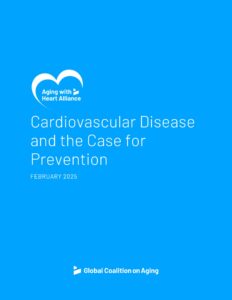 This new GCOA paper, published alongside the launch of the Aging with Heart Alliance, provides an analysis of cardiovascular disease (CVD) as the leading global cause of death and underscores the urgent need for a prevention-based approach. With the world undergoing an unprecedented aging megatrend, CVD prevention is more critical than ever, as aging populations face higher risks of multimorbidity, chronic disease, and healthcare strain. The paper advocates for a continuum-based prevention strategy—spanning primordial, primary, secondary, and tertiary prevention—to mitigate CVD’s growing burden on individuals, healthcare systems, and economies. By emphasizing innovation, policy-driven solutions, and the integration of community-based care, the paper calls for a global commitment to prioritizing prevention as a sustainable and cost-effective solution to combat CVD and promote healthier aging.
This new GCOA paper, published alongside the launch of the Aging with Heart Alliance, provides an analysis of cardiovascular disease (CVD) as the leading global cause of death and underscores the urgent need for a prevention-based approach. With the world undergoing an unprecedented aging megatrend, CVD prevention is more critical than ever, as aging populations face higher risks of multimorbidity, chronic disease, and healthcare strain. The paper advocates for a continuum-based prevention strategy—spanning primordial, primary, secondary, and tertiary prevention—to mitigate CVD’s growing burden on individuals, healthcare systems, and economies. By emphasizing innovation, policy-driven solutions, and the integration of community-based care, the paper calls for a global commitment to prioritizing prevention as a sustainable and cost-effective solution to combat CVD and promote healthier aging.
2025
→
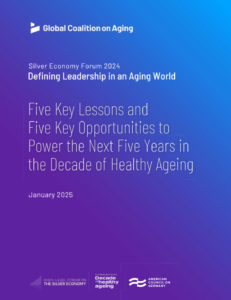 Held in Berlin, Germany, on October 15th and 16th, and the United Nations Headquarters in New York City on December 3rd, 2024, Silver Economy Forum 2024: Leadership in an Aging World explored the opportunities associated with the growing global Silver Economy in a world of changing leadership and discussed what’s needed for successful leadership across issues and generations.
Held in Berlin, Germany, on October 15th and 16th, and the United Nations Headquarters in New York City on December 3rd, 2024, Silver Economy Forum 2024: Leadership in an Aging World explored the opportunities associated with the growing global Silver Economy in a world of changing leadership and discussed what’s needed for successful leadership across issues and generations.
Now in its fifth year, the Silver Economy Forum 2024 highlighted key themes at the intersection of leadership, successful aging, and the Silver Economy, including healthcare and finance challenges, technology’s impact on aging, the core elements in an age-friendly environment, and the future of traditional consumer businesses.
Linking to the goals and aspirations of the UN Sustainable Development Goals and the Decade of Healthy Ageing, speakers at the Forum included representatives from international organizations, leaders in business and government, scientists and academicians as well as civil servants that are leading developments at a grass-roots level.
The Global Coalition on Aging is pleased to have partnered with the American Council on Germany, the Permanent Mission of Germany to the United Nations, and the United Nations Department of Economic and Social Affairs for this year’s Forum.
For more information and to see video from the sessions, please visit the Silver Economy Forum website.
2025
→
On November 12, 2024, the Global Coalition on Aging and the Acton Institute brought together a diverse group of thought leaders—including senior clergy, scientists, G7 leaders, patient advocates, and private sector innovators—at the Pontifical Academy of Sciences in Vatican City for a critical discussion on antimicrobial resistance (AMR). The event, entitled Solving for Antimicrobial Resistance: A Rising Global Health and Humanitarian Crisis, underscored the urgent need for innovation in the fight against drug-resistant diseases, and highlighted the profound humanitarian, ethical, and economic implications of AMR.
The gathering produced a powerful statement calling for urgent global action on AMR, emphasizing the humanitarian, ethical, and economic implications of this growing crisis with the five following key points:
“Antimicrobial resistance is not a distant threat—it is already undermining the health and longevity of millions, especially older adults and vulnerable populations, as was recently noted in The Lancet.1 We have the knowledge and tools to address this crisis, but it will require urgent action from governments, the private sector, and global organizations. The time to act is now, and we must do so with a commitment to equity and global solidarity. Our collective response will determine whether we safeguard the medical advancements of the last century or risk losing them entirely and lurch into a world without antibiotics “
— Mike Hodin, CEO, Global Coalition on Aging
A Growing Global Crisis
Antimicrobial resistance (AMR) threatens to undo decades of medical progress. Currently, AMR is associated with approximately 5 million deaths annually and is projected to cause 39 million deaths over the next 25 years if left unchecked.1 The most vulnerable populations, particularly older adults and the marginalized, face a disproportionate burden from AMR. For these individuals, routine treatments are becoming increasingly unsafe, and the risk of fatal infections is rising. Without urgent action, the world is on the brink of returning to an era where common infections are again life-threatening.
The meeting also underscored the need for global collaboration. Governments, the private sector, and international organizations must work together to create a sustainable pipeline for new antimicrobial innovations. The G7 and EU are encouraged to prioritize regulatory reforms and financial incentives to accelerate research and ensure equitable access to life-saving medicines.
A Call for Justice and Equity in Healthcare
As the Holy See emphasized at the 2024 United Nations High-Level Meeting on AMR, overcoming health inequities is central to addressing the AMR crisis. Pope Francis has often called for action on social justice, and the fight against AMR is a critical issue of fairness and equity. By strengthening market conditions for the development of antimicrobials, society can ensure that all people, regardless of their socio-economic status, have access to the treatments they need.
Hope for the Future
Despite the challenges, there is hope. Countries such as the UK, Japan, Italy, and Canada have taken steps to implement “push” and “pull” incentives, and the U.S. is considering the PASTEUR Act to address the crisis. But more must be done, and it must be done quickly – urgent and coordinated action is needed worldwide to address the pressing issue of AMR.
2024
→
2024
→
 In December 2024, IQVIA released a new white paper, developed in collaboration with GSK and GCOA, examining the significant economic and clinical burden of Respiratory Syncytial Virus (RSV) in older adults (age ≥60 years) across select high-income APEC countries, including China, Japan, South Korea, Canada, Singapore, New Zealand, Australia, Hong Kong, and Taiwan.
In December 2024, IQVIA released a new white paper, developed in collaboration with GSK and GCOA, examining the significant economic and clinical burden of Respiratory Syncytial Virus (RSV) in older adults (age ≥60 years) across select high-income APEC countries, including China, Japan, South Korea, Canada, Singapore, New Zealand, Australia, Hong Kong, and Taiwan.
The study estimated that in 2023, RSV caused around 778,000 hospitalizations and USD 2.8 billion in costs, with the highest burden observed in China, followed by Japan and Canada. On average, 1 in 500 older adults were hospitalized annually, with costs ranging from USD 2,735 in New Zealand to USD 12,826 in Canada. The true burden of RSV is likely under-reported due to non-specific symptoms, suboptimal diagnostics, and inconsistent testing. The paper and its findings highlight the critical need for dedicated surveillance systems and standardized diagnostic practices for RSV in Asia-Pacific countries.
2024
→
Following the passage of the Inflation Reduction Act in 2022, healthcare systems in the United States are facing many changes in the name of saving costs and creating efficiencies. But do the benefits actually outweigh the costs?
GCOA’s issue brief, “Utilization Management Post-Inflation Reduction Act and the Threat to Healthy Aging,” addresses the unintended negative consequences of utilization management (UM) on older, minority and other underserved populations. As the population aged 65 and older grows rapidly, projected Medicare costs are soaring, prompting insurers to adopt UM strategies to control expenses. These methods—such as step therapy, prior authorization, and quantity limits—aim to assess the necessity of medications but often restrict patient access and delay essential treatments.
UM disproportionately affects older Americans, many of whom manage multiple chronic conditions and rely on numerous medications. Additionally, underserved populations face higher claim rejections, exacerbating existing health disparities. Delays in accessing critical treatments can lead to severe health consequences, particularly for those who rely on uninterrupted access to the best medications for their treatment plan.
Administrative burdens imposed by UM further complicate care, increasing stress for patients, caregivers, and healthcare providers – all begging the question whether UM strategies truly result in any net savings. The brief calls for a reevaluation of UM as a cost-saving method, advocating for alternative solutions that prioritize patient health and equitable access to medications, particularly as our aging population continues to grow.
This issue brief was made possible by support from Bristol Myers Squibb.
2024
→
Growing evidence suggests that employers across size, sector, and industry types are now recognizing support for their employees’ health as a “must have,” or, to be more precise, “a must offer.” In these calculations, preventive care has become a key priority for the workforce, not least because of the parallel benefits to the employer.
 This new GCOA paper, launched ahead of Silver Economy Forum 2024, examines how industry leaders are creating business value, engaging their workforce, improving productivity and economic value, and advancing top private-sector priorities by taking action on preventive health for their employees through employee benefits and policies, such as supporting access to adult immunization, mental health supports, and health screenings. The paper outlines how companies like Amazon, Amgen, Bank of America, Biogen, British Airways, Citibank, Dell, Edwards, Google, IBM, and Microsoft have made robust efforts to embrace employee health and well-being.
This new GCOA paper, launched ahead of Silver Economy Forum 2024, examines how industry leaders are creating business value, engaging their workforce, improving productivity and economic value, and advancing top private-sector priorities by taking action on preventive health for their employees through employee benefits and policies, such as supporting access to adult immunization, mental health supports, and health screenings. The paper outlines how companies like Amazon, Amgen, Bank of America, Biogen, British Airways, Citibank, Dell, Edwards, Google, IBM, and Microsoft have made robust efforts to embrace employee health and well-being.
2024
→
 As global populations age, the need for businesses to recruit and retain older workers becomes increasingly vital. This new report, together with GCOA member Bank of America, explores the importance of embracing this demographic shift, not only to combat ageism but also to enhance organizational success and foster healthier communities.
As global populations age, the need for businesses to recruit and retain older workers becomes increasingly vital. This new report, together with GCOA member Bank of America, explores the importance of embracing this demographic shift, not only to combat ageism but also to enhance organizational success and foster healthier communities.
Employee benefits packages, including health insurance, retirement plans, and flexible work arrangements, are crucial tools for attracting and retaining older talent. By offering tailored benefits—such as caregiving leave, phased retirement, and financial planning support—employers can extend careers, leverage the unique expertise of older workers, and ensure sustained productivity.
This report highlights best practices for creating an age-inclusive environment, demonstrating how businesses can build comprehensive benefits that support both personal and professional well-being, resulting in a healthier, more engaged workforce.
2024
→
On Ageism Awareness Day 2024, GCOA launched a new report highlighting the role of ageism as a social determinant of health, illustrated through the example of heart valve disease. As outlined in the paper, The Health and Economic Costs of Ageism as a Social Determinant of Health: The Case of Heart Valve Disease, ageism results in underdiagnosis and undertreatment of conditions like heart valve disease, where timely intervention can dramatically improve outcomes and lead to significant cost savings for health systems and society.
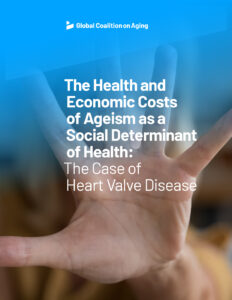 Despite tremendous scientific innovation and the availability of advanced treatments, ageist systems, attitudes, and beliefs continue to place countless lives at unnecessary risk by preventing timely access to care and treatment. The paper shares evidence of ageism’s impact on health outcomes and system costs and outlines concrete steps for stakeholders to take in the fight against ageism, unlocking the full benefit of innovation for individuals and their families, healthcare systems, and society at large.
Despite tremendous scientific innovation and the availability of advanced treatments, ageist systems, attitudes, and beliefs continue to place countless lives at unnecessary risk by preventing timely access to care and treatment. The paper shares evidence of ageism’s impact on health outcomes and system costs and outlines concrete steps for stakeholders to take in the fight against ageism, unlocking the full benefit of innovation for individuals and their families, healthcare systems, and society at large.
2024
→
On June 6, 2024, The Global Coalition on Aging (GCOA) Alliance for Health Innovation convened a roundtable discussion of cross-sectoral experts representing patients, caregivers, academia, biopharmaceutical innovators, and business communities to discuss Prescription Drug Affordability Boards (PDABs), Upper Payment Limits (UPLs), and the risk they pose to the innovation that is needed to safeguard healthy aging and improve health equity.
This brief builds on two previous GCOA Alliance for Health Innovation policy briefs—the first from June 2023 on healthy aging and innovation, and the second from September 2023 on the intersection of healthy aging, innovation, and oncology – and highlights the themes that emerged from the roundtable discussion, including patient concerns with PDABs and recommended best practices for patient engagement in States that have implemented or are considering the implementation of PDABs and UPLs.
Key Takeaways:
The Global Coalition on Aging Alliance for Health Innovation brings together over 20 patient advocacy organizations, scientists, and policy specialists to establish awareness of the importance of innovation in achieving healthy aging through investments, policy reforms, and strategic partnerships – both for the value to patients and for health system sustainability.
2024
→
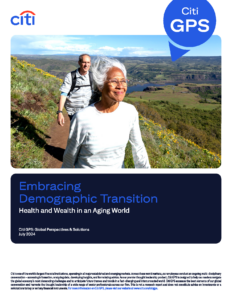
The Global Coalition on Aging is proud to contribute to Citi Global Perspectives & Solutions’ (GPS) July 2024 report, Embracing Demographic Transition: Health and Wealth in an Aging World. CEO Michael Hodin and Executive Director Melissa Mitchell authored the report’s conclusion.
Citi GPS collated perspectives from across Citi and its global network to explore how society’s extra years of life expectancy can be lived as social contributors rather than dependents. From these expert contributions, Citi finds that supporting the health and wealth of an aging population are the levers to pull if our aim is to minimize the dependence of an aging population. Citi sees four dimensions:
Read the full report here.
2024
→
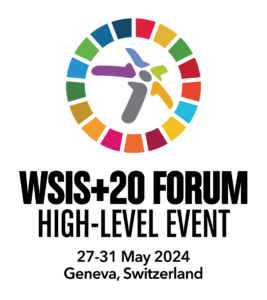 At the World Summit on the Information Society, May 30, 2024, GCOA hosted a panel discussion on the global health crisis that is AMR and how technology can, should and will have an impact through diagnostics, surveillance, and innovative developments. AMR will be responsible for 10 million deaths annually by 2050 – on track to be more deadly than cancer. AMR makes even the most common medical procedures, such as knee replacements, cancer treatments, root canals and caesarian sections, risky or even deadly, and those most vulnerable are in lesser developed countries. Click here for the Outcome Report. You can watch the panel here.
At the World Summit on the Information Society, May 30, 2024, GCOA hosted a panel discussion on the global health crisis that is AMR and how technology can, should and will have an impact through diagnostics, surveillance, and innovative developments. AMR will be responsible for 10 million deaths annually by 2050 – on track to be more deadly than cancer. AMR makes even the most common medical procedures, such as knee replacements, cancer treatments, root canals and caesarian sections, risky or even deadly, and those most vulnerable are in lesser developed countries. Click here for the Outcome Report. You can watch the panel here.
The panel included the participation of Ms. Latifat Okara, Principal and Americas Regional Lead, Economist Impact; John-Louis Tissier, Vice President Government and Public Affairs, bio-Mérieux: Dr. Raghu Sriram, Scientist, World Health Organization (WHO ) and Pol Vandenbroucke, Vice President Global Government Affairs, Shionogi, who served as the moderator. You can read more about the panel on our blog. For the WSIS official page, click here.
2024
→
We are thrilled to announce this year’s Silver Economy Forum will be in-person and broadcast live from Berlin, Germany on October 16. The Global Coalition on Aging is pleased to partner with the American Council on Germany for this year’s Forum.
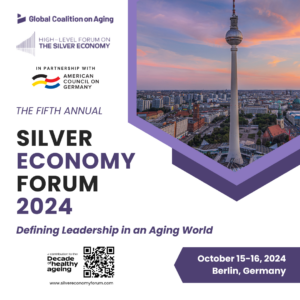 Now in its fifth year, SEF 2024 will highlight key themes at the intersection of leadership, successful aging, and the Silver Economy, including healthcare and finance challenges, technology’s impact on aging, the core elements in an age-friendly environment, and the future of traditional consumer businesses. Linking these themes to the goals and aspirations of the UN Decade of Healthy Ageing and the Sustainable Development Goals (SDGs), GCOA and ACG will dive into what businesses and countries must do to stay competitive in a rapidly aging and changing society and how intergenerational workforces can impact the success of the global workplace.
Now in its fifth year, SEF 2024 will highlight key themes at the intersection of leadership, successful aging, and the Silver Economy, including healthcare and finance challenges, technology’s impact on aging, the core elements in an age-friendly environment, and the future of traditional consumer businesses. Linking these themes to the goals and aspirations of the UN Decade of Healthy Ageing and the Sustainable Development Goals (SDGs), GCOA and ACG will dive into what businesses and countries must do to stay competitive in a rapidly aging and changing society and how intergenerational workforces can impact the success of the global workplace.
2024
→
In April 2024, GCOA convened the private workshop of experts and officials from Japan, Canada, the United Kingdom, Italy, the European Union, and the United States to discuss the need for action on the implementation of pull incentives – a policy option that could address the critical need for new antimicrobials – across both the G7 and European Union, as well as globally.
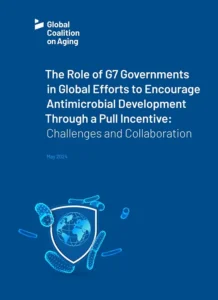 At the meeting and in the report that followed, “The Role of G7 Governments in Global Efforts to Encourage Antimicrobial Development Through a Pull Incentive: Challenges and Collaboration,” leaders called on G7 governments to fund pull incentives and make “fair share” investments in antibiotic innovation to fight the global antimicrobial resistance (AMR) crisis.
At the meeting and in the report that followed, “The Role of G7 Governments in Global Efforts to Encourage Antimicrobial Development Through a Pull Incentive: Challenges and Collaboration,” leaders called on G7 governments to fund pull incentives and make “fair share” investments in antibiotic innovation to fight the global antimicrobial resistance (AMR) crisis.
They found that:
In September, countries will gather for the 2024 UNGA High-Level Meeting on AMR, where they have the opportunity to put the findings of this report into place.
The roundtable and report, available in both English and Japanese, were funded by the Japanese Pharmaceutical Manufacturer’s Association (JPMA).
2024
→
In January 2024, the Global Coalition on Aging convened a group of preeminent experts from various fields including infectious diseases, population aging, economics, advocacy, caregiving, and policy for a roundtable discussion on RSV. The aim of the roundtable was to share local and international insights on the impact, gaps, and opportunities to better address RSV in the Asia-Pacific region, including the role of surveillance and data monitoring, public health education, and the importance of prevention.
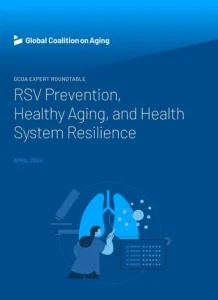 Respiratory infections like influenza, RSV (respiratory syncytial virus), and now COVID-19, among others, place a substantial and growing burden on health systems. Among these three infections—responsible for the so called “tripledemic”—RSV is the least recognized. There is low awareness of RSV among healthcare professionals and the general public and little understanding of the disease burden and impact in older adults globally, but particularly in the Asia-Pacific region—which is rapidly aging.
Respiratory infections like influenza, RSV (respiratory syncytial virus), and now COVID-19, among others, place a substantial and growing burden on health systems. Among these three infections—responsible for the so called “tripledemic”—RSV is the least recognized. There is low awareness of RSV among healthcare professionals and the general public and little understanding of the disease burden and impact in older adults globally, but particularly in the Asia-Pacific region—which is rapidly aging.
This report, released in April 2024, shares four key takeaways from this roundtable, culminating in a set of calls to action, including the need to establish a an Asia-Pacific RSV consortium to enhance data surveillance and support planning and decision-making in the region.
2024
→
 A March 2024 report from the Transamerica Center for Retirement Studies (TCRS) in collaboration with Transamerica Institute finds that almost seven in ten employers either currently or plan to use robotics or artificial intelligence to augment their human workforce. The report, Workplace Transformations: Employer Business Practices and Benefit Offerings, is based on a survey of 1,873 employers of for-profit companies.“Robotics and artificial intelligence may be revolutionizing the business world, but human workers are still critically needed. Many employers are feeling the pain of the prolonged labor crunch. Those with innovative and robust benefit offerings have an edge in the competition for talent,” said Catherine Collinson, CEO and president of Transamerica Institute and TCRS. The report analyzes companies by size and uses contextual comparisons with Transamerica Institute’s most recent survey of workers.
A March 2024 report from the Transamerica Center for Retirement Studies (TCRS) in collaboration with Transamerica Institute finds that almost seven in ten employers either currently or plan to use robotics or artificial intelligence to augment their human workforce. The report, Workplace Transformations: Employer Business Practices and Benefit Offerings, is based on a survey of 1,873 employers of for-profit companies.“Robotics and artificial intelligence may be revolutionizing the business world, but human workers are still critically needed. Many employers are feeling the pain of the prolonged labor crunch. Those with innovative and robust benefit offerings have an edge in the competition for talent,” said Catherine Collinson, CEO and president of Transamerica Institute and TCRS. The report analyzes companies by size and uses contextual comparisons with Transamerica Institute’s most recent survey of workers.
2024
→
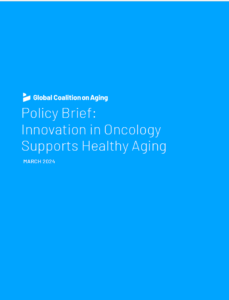 On September 27, 2023, The Global Coalition on Aging (GCOA) Alliance for Health Innovation and The American Federation for Aging Research (AFAR) convened for a roundtable discussion on cancer, innovation, and healthy aging. Experts on cancer treatment, health policy, aging, and patient voices explored the value of biomedical innovation, and the importance of both the availability and accessibility of innovative treatments, with a focus on oncology, as a prerequisite for healthy aging.
On September 27, 2023, The Global Coalition on Aging (GCOA) Alliance for Health Innovation and The American Federation for Aging Research (AFAR) convened for a roundtable discussion on cancer, innovation, and healthy aging. Experts on cancer treatment, health policy, aging, and patient voices explored the value of biomedical innovation, and the importance of both the availability and accessibility of innovative treatments, with a focus on oncology, as a prerequisite for healthy aging.
This policy brief highlights the themes that emerged from the roundtable discussion and provides key policy recommendations to ensure equitable access to future biomedical innovations and contribute to healthy aging for all that can be applied not only to oncology, but also the broader biomedical innovation ecosystem within the United States:
The Global Coalition on Aging Alliance for Health Innovation brings together over 20 patient advocacy organizations, scientists, and policy specialists to establish awareness of the importance of innovation in achieving healthy aging through investments, policy reforms, and strategic partnerships – both for the value to patients and for health system sustainability.
2024
→
Why an Age-Friendly City or Community Has to Address Osteoporosis
 Good bone health improves strength and mobility for greater independence and increased wellbeing among older adults. A bone health program is a smart investment, ensuring that older adults can live happier and healthier lives in their communities.
Good bone health improves strength and mobility for greater independence and increased wellbeing among older adults. A bone health program is a smart investment, ensuring that older adults can live happier and healthier lives in their communities.
The Global Coalition on Aging Bone Health Initiative’s new guide for age-friendly cities and communities provides an overview of challenge poor bone health presents for age-friendly cities and communities, why it’s critical to act to address bone health, and provides guidelines for age-friendly cities and communities to develop their own bone health programs.
